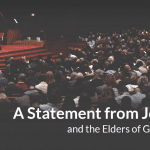There is a serious need for discussion among Bible-believing Christians about what it means to be faith-based. Does is mean faith based in the God of the Bible or faith based in Uncle Sam?
Thousands of evangelical Protestants have made a remarkable departure from the teachings of scripture, while also rejecting their historical and biblical roots by choosing to apply for and receive federal money to fund their payrolls.
Of the 4.9 million loans that were approved by the U.S. Small Business Administration’s Paycheck Protection Program, 10,682 went to religious organizations. They received between $3 billion and $7.5 billion in taxpayer funded money, according to calculations by OpenTheBooks.com, a nonprofit organization that takes no federal money.
Funding came from the $80 billion Small Business Relief Act. Combined with previous bills passed by Congress and compounded by economic factors, the result is an estimated $5.8 trillion added to the national debt, according to a CATO Institute estimate.
June’s federal budget deficit was $864 billion, an amount greater than the entire federal budget deficit for the year of 2018, according to the Congressional Budget Office. And that is before Congress passes the next $1 trillion “stimulus” bill.
Among the 10,682 religious organizations, roughly 980 are in Texas, a state with the largest number of self-identifying evangelicals in the U.S., roughly 6.5 million, according to 2010 Census data.
While Roman Catholic, Jewish, Islamic, and others religious entities applied for and received money, this column only addresses evangelicals.
Among the 980 Texas entities, 15 received the most, between $2 and $5 million. The majority of the 15 identify as evangelical Protestant and faith-based organizations. Their mission statements posted on their websites clearly state that their purpose is to teach and preach the gospel and create disciples.
They are among Texas’ largest mega churches: First Baptist Church of Dallas, First Baptist Church of Houston, Grace Community of Tyler, Lake Pointe Baptist Church in Rockwall, Oak Cliff Bible Fellowship in Dallas; and the Baptist General Convention of Texas.
Also included in the top 15 receiving between $2 and $5 million are Maxus Healthcare Partners, LLC, Morningside Ministries (an assisted living facility), Pine Cove Inc. (a Christian camp), Trinity Broadcasting of Texas, Inc., Word of God Fellowship Inc. (Daystar Television), Wycliffe Seed Company, Potter’s House in Dallas, St. Luke’s Methodist Church of Houston, and St. Martin’s Episcopal Church of Houston.
The remainder includes 48 religious organizations that received between $1 and $2 million, 268 that received between $350,000 and $1 million, and the majority —647— that received between $150,000 and $350,000.
These 980 religious organizations do not solely represent Texas’ more than 6.5 million self-identifying evangelicals.
According to 2010 Census data, Texas has the most “non-denominational” evangelical Protestant churches in the U.S. of approximately 1.5 million. New data will be published next year to provide a more accurate picture.
Protestants did not arrive in the land that would become Texas until the Second Great Awakening in roughly 1815 when it was still under Spanish rule. (Texas is the only state in the Union to have been under the rule of six different governments, and to be a republic with its own currency and military.) Under Mexican rule (1821 to 1836), Texan colonists were required to be members of the Roman Catholic Church to be able to live there. (They also had to be married by a priest to be legally married. A civil government license by itself was invalid.)
Texans later fought for independence, created their own Republic (1836-1845), became a state in 1845, joined the Confederacy (1861-1865), and then rejoined the United States in 1865. Throughout these tumultuous times, faithful believers remained steadfast in preaching the gospel, also ministering to the sick and the poor.
Texans can trace their roots to their Scottish, English, French and German ancestors who knew very well the cost of wars fought over religious freedom.
In 1381, theological scholar and the “Morning Star of the Protestant Reformation,” John Wycliffe, committed to translate the Bible into English. The first Bible translated into the vernacular in the entire world was the Wycliffe Bible.
“Wycliffe was more convinced of the power of the word of God than the power wielded by the papal office,” Desiring God Ministries states. “Consequently, he and a group of colleagues committed themselves to making the word of God available.”
He also sought to create “an order of Poor Preachers who would take Bible truth to the people,” Encyclopedia Britannica states. Hundreds of Bibles were translated by hand and distributed to pastors who preached throughout England.
Wycliffe witnessed and survived the Black Death of 1348, which killed between 30 and 60 percent of the population in Europe.
(By contrast, .04 percent of the U.S. population has died from the coronavirus in the U.S. and government agencies have been misreporting data, according to a groundbreaking report by the Claremont Institute. Texas’ coronavirus crisis has also been one of misreporting and misrepresenting data. Many are asking why the state has not reopened when the number of coronavirus-related deaths as a percentage of the population is .02 percent and the number of positive cases being reported as a percentage of the population is 1.58 percent. These numbers have also been questioned because of local governments’ duplicative reporting of data, and numerous reports of residents receiving test results stating they tested positive when they were never tested at all and are not sick.)
Wycliffe is also is expected to have been in Oxford at the time of the St. Scholastica Day riot, which resulted in the death of roughly 100 students and townspeople. (By contrast, the fascist Antifa riots have destroyed peoples’ homes and businesses, resulting in the murder of civilians in major U.S. cities.)
Wycliffe would have known what it was like to live in fearful and uncertain times. Yet he remained an outspoken critic of the Roman Catholic papal government, declaring, “I am ready to defend my convictions even unto death.” His convictions were rooted in the authority and centrality of Scripture.
Translating the Bible was a political act of defiance. It led to wars that endured for centuries. According to Roman Catholic law, which ruled over Europe at the time, translating the Bible into any common language other than Latin was a heresy, punishable by death.
Czech theologian and philosopher, Jan Hus, a leader of the Bohemian Reformation influenced by Wycliffe, was condemned to death in 1415 and burned alive.
The Council of Constance, which condemned him, also declared Wycliffe a heretic and ordered that his bones be exhumed and burned. Twenty years after his death, Wycliffe’s ashes were dumped into the River Swift.
More than 100 hundred years later, Wycliffe’s testimony influenced German reformer Martin Luther. Under protection of a German prince Luther would translate the New Testament into German, sparking another revolution.
Protestantism is historically rooted in protest. Protest against a corrupt government, against corrupt religious leaders and false teachers. Protest is rooted in the “pro,” an argument in favor of a “testament,” which is a statement of belief.
Their pro-testament is historically rooted in: Sola Scriptura (Scripture alone), Sola Fide (Faith alone), Sola Gratia (Grace alone), Solus Christus (Christ alone), and Soli Deo Gloria (Glory to God alone).
Evangelicals’ unique claim is that scripture alone is the basis for authority over our lives—not the pope—not the federal government, not state or local governments and not the U.S. Supreme Court. No government can restrict how we worship, whether or not we can sing or pray, or when, where, and how many people can be in the same room to worship. Yet today, churches requiring RSVPs to hear the gospel or attend a bible study appear to have forgotten this.
To be sure, not everyone who claims to be a Christian is one. Not all churches preach the gospel; many are apostate and teach false doctrine. Evangelicals should be the exception.
Which is why many may be very disheartened to learn that a church or ministry they have supported are on the SBA list. Believers have expressed disillusionment about their leaders soliciting and relying on Uncle Sam instead of on the body of Christ and the God of the Bible.
Many may be saddened to learn that a self-identifying evangelical Bible translation organization using the historic name of Wycliffe would have applied for and received between $2 and $5 million from the federal government.
John Wycliffe and his pastoral team did not rely on debt or taxation, the papal government, the Church of England or any ruling authority to translate the Bible. While Luther translated the Bible under the protection of a prince in a castle, he was only there because the prince had saved him from being burned alive.
The Wycliffe Seed Company argues it “is at the cutting edge of bringing the Bible to people who have never had God’s Word in a language they understand.” Its mission is to “accelerate Scripture translation and impact for people without God’s Word through Great Commission partnerships.”
However, the federal government is now funding a “faith based” organization whose stated purpose is “to serve the local church by providing training, consulting, funding, and project management that leads to a meaningful, accurate translation in the local mother tongue.”
As critics have pointed out, this is a violation of the First Amendment. More importantly, it is not what the Bible—the very book they claim to be translating—teaches.
In 1890, 45 years after Texas became a state, “a small group of believers determined to begin a Baptist church in downtown Dallas laid the first cornerstone of First Baptist Dallas,” according to church’s website. “Under the leadership of legendary pastors and teachers like George W. Truett and W.A. Criswell, First Baptist Dallas became an anchor in the Christian community, a church known for a firm foundation built on the Bible.”
Despite its claims or the generosity of its more than 13,000 members, church leaders solicited Uncle Sam to receive between $2 and $5 million to fund 293 employees’ salaries.
Just four years earlier, the church’s “Fuel the Fire” campaign was created to “transform our world with God’s Word… one life at a time.” It had a “two-year goal (December 1, 2016-November 30, 2018) for our ministry budget, debt reduction, and mission initiatives, is a total of $50 million.”
Now, in 2020, it can’t operate without federal funding? What was First Baptist doing before the SBA, during the Great Depression, during World War II, during the Vietnam riots, during the oil crash of the 1980s, or during any other turbulent time? How on earth did it survive for 130 years without the federal government funding its payroll?
“In spring 1837, one year after the Battle of San Jacinto, missionary Zachariah Morrell offered Babylon on the Bayou its first taste of Christ,” the Houston Chronicle reported in an exposé on Houston First Baptist’s 175-year anniversary in 2016. “When Baptist preacher James Huckins hit town four years later, he found the young republic’s capital ripe for redemption.”
Initially, the church had 16 members. By 2016, the membership was around 28,000 and the church had “grown into one of Texas’ leading Southern Baptist congregations, with an annual operating budget in excess of $31 million and a missions outreach that spans the globe.”
Yet in 2020 it couldn’t fund its payroll without federal funding? Instead of going to its congregation its leaders went to Uncle Sam to receive between $2 and $5 million to pay the salaries of 421 employees.
Stories like these—a handful of people founding a church struggling through the hard oil boom and bust years, and civil strife and upheaval in Texas—can be found among the histories of many of the 980 religious institutions that applied for federal money. Many of their testimonies tell how they relied on each other and on God. None claim their existence, their ability to remain open, was because of the federal government.
Until now.
To be transparent, I have attended a number of churches in Dallas and Houston, including women’s bible studies at Houston First Baptist and its gym. I am not, and never have been, a Southern Baptist.
I contacted 10 evangelical organizations in Texas that received the most money out of the 980 organizations, between $2 and $5 million. I asked them to provide a comment about what biblical reason its leaders used to solicit the federal government to fund its ministry. Only two replied.
The eight that did not reply include:
- Baptist General Convention of Texas, Dallas, received $2 million to $5 million to pay the salaries of 229 employees. The Houston Chronicle recently published, “20 years, 700 victims: Southern Baptist sexual abuse spreads as leaders resist reforms” about the convention. Even if the known abusers are gone, did the convention’s leaders not consider how the sex abuse victims might feel about their tax dollars partially funding the SBC payroll?
- Chapelwood United Methodist Church, Houston, received between $2 million to $5 million to pay the salaries of 435 employees.
- First Baptist Church of Dallas, received between $2 million to $5 million to pay the salaries of 293 employees.
- Grace Community of Tyler received between $2 million to $5 million to pay the salaries of 401 employees.
- Lake Pointe Baptist Church, Rockwall, received between $2 million to $5 million to pay the salaries of 279 employees.
- Oak Cliff Bible Fellowship, Dallas, received between $2 million to $5 million to pay the salaries of 245 employees.
- Trinity Broadcasting of Texas, Inc., Fort Worth, received between $2 million to $5 million to pay the salaries of 336 employees.
- Word of God Fellowship Inc., (Daystar TV) Bedford, received between $2 million to $5 million to pay the salaries of 303 employees. I contacted Daystar TV and spoke with a receptionist who would not provide me with a media contact or even a general info@ email address. Instead, she transferred me to a woman’s voicemail. I left a message and received no response.
- Wycliffe Seed Company, Arlington, received between $2 million and $5 million to pay for an unknown number of salaries. (The exact number was not listed in the SBA data.)
The two replies I received, include:
- First Baptist Church of Houston, which received $2 million to $5 million to pay the salaries of 421 employees. Steven W. Murray, Director of Communications at Houston First Baptist Church, said:
“In April 2020, Houston’s First Baptist Church applied for a loan through the PPP. At the time of the application, giving to the church was trending downward compared to the year before and the price of oil — which impacts the Houston economy — was at historically low levels. To protect hundreds of employees at the church and given the uncertain economic forecast for the following months at that time, the church proceeded with the loan application process.
“The decision to apply for a loan was approved through the church’s established governance process, with approval given first by the Finance Committee comprised of lay members, then by the Deacon body, and then voted upon at a monthly Church Conference. The Church Conference typically takes place at the church, but this one took place via a Zoom meeting due to the COVID-19 pandemic. Information about how to join in on the Church Conference was made available so any member could attend, as listed here on the church website’s event calendar. Minutes from the Church Conference can be found here.
“Our loan application was subsequently approved by the Small Business Administration. Thanks to the increased generosity of the Houston’s First family and a turnaround in the local economy, the church has not needed to use those funds as of July 16, 2020. Fortunately, we have been able to maintain our payroll and employee headcount so far without the use of the loan.”
In response, I asked since the congregation is so generous would the church be returning the money? I did not get a reply.
While I appreciate his response and the church’s transparency, the Texas oil and gas industry is well known for its boom and bust years. The industry was already experiencing an 18-month decline when the Saudi-Russian oil war hit early this year causing oil prices to tank. The state’s coronavirus shutdown in March made matters worse. Three months later, the industry is showing some signs of growth.
But this is not really the point. If our circumstances determine our faith what does that say about what we believe about who God is?
- Pine Cove Inc. Tyler, received between $2 and $5 million to pay the salaries of 250 employees. Phillip McLeod, Chief Financial Officer of Pine Cove, replied:
“As a 53 year-old non-profit Christian ministry, Pine Cove serves tens of thousands of campers, families and college staff across our multiple properties each summer. Following the significant losses in the spring and anticipated losses this summer due to the pandemic, the $2.5 million small business loan we received allowed us to retain as many of our staff as possible, including over 200 year-round positions and almost 2,000 seasonal college students needed to make camp ministry happen this summer; and with help from our donors and a significant reduction of expenses, we were able to proclaim the Gospel to thousands who needed to be ministered to now more than ever in the wake of the pandemic, without compromising our biblical values.”
In 1967, Bill McKenzie “faithfully followed God’s direction and started a camp called Pine Cove,” which is “gospel-centered,” according to the camp’s website. He did not do so by requesting federal money. Somehow, over the last 53 years, the camp was able to grow to 11 new locations in the southeast and serve 1 million campers without federal money. Until now.
The majority of the websites of the top 15 recipients only list a general number with a voicemail and a general email contact form. Only a few have a receptionist who answers the phone. Less than a handful make church leadership contact information available. Some could argue the lack of transparency on these websites might be an indication of an overall lack of transparency in other areas of these ministries.
Below are some of the questions I asked, and encourage others to do the same:
- Is there a passage of scripture that guided you in making your decision to take federal money?
- What led you to believe that the federal government should be responsible for keeping your organization solvent?
- What were the criteria you used to determine that your organization would have gone out of business had you not received federal money?
Many are asking what kind of message do evangelicals (purporting to be faith-based and taking federal money to live comfortably) communicate to persecuted believers in other countries who are being burned alive and buried alive for their faith?
Others ask how these leaders are different from Planned Parenthood executives whose salaries are also being funded by federal money? Or Islamic organizations running jihad camps that are also receiving federal money?
Still others ask how these groups are different from the white washed tombs Jesus describes in Matthew 23:25-28 or how their leaders differ from those described in Matthew 7:21–23? (Jesus includes religious leaders who claim they “did many mighty works in [his] name” in his “seven woes.” In response to them, he says, “I never knew you; depart from me, you workers of lawlessness.”)
“‘I never knew you’ means ‘I don’t recognize you as my disciple,’” John Piper explains. “‘I don’t acknowledge you as my follower. You are a spiritual stranger to me.’ Judas would be the best example here from Jesus’s life. For three years, he cast out demons and did many mighty works with Jesus. In the end, he was driven by money, not by love for Jesus. We know that from John 12:6. He’s called a thief. He was excluded at the end of all that time with Jesus.”
An opportunity still exists among evangelicals on the SBA list to demonstrate what repentance, transparency and accountability looks like, according to what the Bible teaches.
Perhaps some decisions to accept money were made out of fear, greed, a misunderstanding of what the Bible teaches or of the government’s role. Perhaps leaders believed they were making the right decision at the time without understanding the serious consequences they now face. Whatever, the motivation, there is still the opportunity for a course correction.
Otherwise, unlike Abram in Gen. 14, they are claiming that their wealth comes from the government, not from God.
A list of Texas religious organizations receiving federal money is published here, thanks to the help of OpenTheBooks.com.
Its auditors mapped the largest loans – nearly 83,000 in amounts of $1 million to $10 million – located in 13,700 zip codes across the country. Using this free tool, taxpayers can find out which organizations (secular and religious) received federal money through an agency created to help small businesses.












